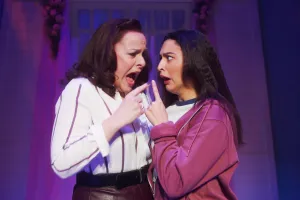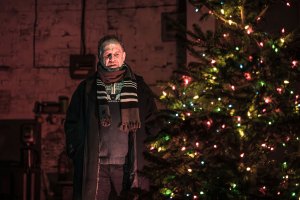Hannah Khalil On … Formulating Plan D
Plan D is a new play by Palestinian Irish writer Hannah Khalil which debuts at London’s Tristan Bates Theatre this week (26 January 2010), and continues until 13 February.
I’ve written several plays now and usually the hardest thing for me is picking a title: Not so with Plan D.
In March 2008 I was at a seminar at SOAS (the School of Oriental and African Studies) called ‘The Eye of the Spoken Word: Oral History and The 1948 Nakba’.
This seminar aimed to bring together scholars, filmmakers and oral history specialists to reflect on the narratives of the 1948 Nakba to try and preserve the Palestinian collective memory.
This is a topic of particular interest to me as I am half-Palestinian and, although I have never lived there myself, I still have family in the West Bank. My father – an incredibly inspiring man who taught himself English at night under the street lamps by a motorway in Kuwait – has told me many wonderful, evocative stories from his childhood, and I’ve wanted to weave them into the narrative of a play for some time.
At the Oral Histories Day I heard much more of the history of 1948, from the mouths of those that lived through it, both Israelis and Palestinians, in interviews recorded by Israeli filmmaker Eyal Sivan who is trying to piece together a recorded archive called Fragments Of A Common Archive.
What struck me most was the dignity of the tellers, the detail of time and place and the fact that barely a tear was shed: all too often in news reports Palestinians are shown as angry, wailing people burying their dead, here instead I saw people who were grateful that, at last, someone wanted to hear their story, and keen to ensure they told it correctly.
It was these personal stories and experiences, largely untold, which inspired me to write Plan D, in which I’ve created a fictional family faced with the same impossible question that too many Palestinians were in 1948: should we stay in our home and risk life and limb, or leave our country and seek safety elsewhere?
Most had no choice but to leave, and so convinced themselves the war would pass and that they would return home soon, little imagining that 62 years later more than 7 million Palestinians would still be displaced.
As I sat in the lecture room and thought about the play I would write, noting down particular anecdotes to include, one of the academics explained that the name of the Israeli Military Operation to expel the Palestinians was called Plan D.
This, I thought, was the perfect title for the play, in that anyone who knew the history of the time would understand the reference and anyone who didn’t would (I hoped) think that Plan D was probably the last option for our fictional family (after Plans A, B and C had failed).
So, for once, the title came first, then the play, and now the production, which is on at the Tristan Bates Theatre from 26 January to 13 February. Anyone interested in seeing Eyal Sivan’s Fragments Of A Common Archive should try and come along on Tuesday 9 February when Eyal will be saying a few words and then screening the film after the performance, free for that night’s audience.
Hannah Khalil is a writer and actress, she currently lives in London. For more information on Plan D, click here












